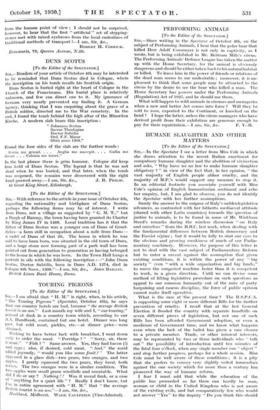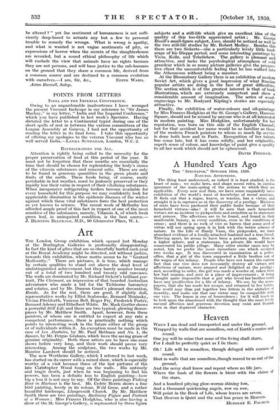HUMANE SLAUGHTER AND OTHER MATTERS
[To the Editor of the SPECTATOR.] SIR,—In the Spectator I see a letter from Miss Cole in which she draws attention to the recent Italian enactment for compulsory humane slaughter and the abolition of vivisection and asks, " Why have we no law to make humane slaughter obligatory ? " in view of the fact that, in her opinion, " the vast majority of English people abhor cruelty, and the majority of M.P.'s would support any measure to stop it. In an editorial footnote you associate yourself with Miss Cole's opinion of English humanitarian sentiment and echo her enquiry, but, I am glad to observe, you do not identify the Spectator with her further assumptions.
Surely the answer to the enigma of Italy's sudden legislative advances, as contrasted with her hitherto mediaeval attitude (shared with other Latin countries) towards the question of justice to animals, is to be found in some of Mr. %Vic:khan' Steed's remarks during the wireless discussion " on Italy and ourselves " from the 13:13.C. last week, when dealing with the fundamental difference between British democracy and the Fascist regime ; but it would be folly to shut our eyes to the obvious and growing creakiness of much of our Parlia- mentary machinery. However, the purpose of this letter is not to deal with the vast subject of Parliamentary Reform but to enter a caveat against the assumption that given existing conditions, it is within the power of any big society" oven "with a wide organization and big funds," to move the congested machine faster than it is competent to work, in a given direction. Until we can devise some method of lifting legislative procedure on such questions as appeal to our common humanity out of the mire of party bargaining and caucus discipline, the force of public opinion cannot make itself operative.
What is the case at 'the present time ? The R.S.P.C.A. is supporting some eight or more different Bills for the further prevention of cruelty. I recall that at the last General Election it flooded the country with separate handbills on seven different pieces of legislation, but not one of such Bills has been afforded Government adoption, or even a modicum of Government time, and we know what happens even when the luck of the ballot has given a rare chance to a private member. Trade, or other inimical interests, may be represented by two or three individuals who " talk out" the possibility of introduction until ten minutes of the fatal four o'dlock, when any single member can " object " and stop further progress, perhaps for a whole session. Miss Cole must be well aware of these conditions ; it is a pity that she prefers to convey very slightly veiled innuendoes against the one society which for more than a century has pioneered the way of humane reform.
I fear I must add that while the education of the public has proceeded so far there can hardly be man, woman or child in the United Kingdom who is not aware of the existing evils, and but comparatively few who would not answer "Yes" to the inquiry " Do you think this should be altered ? " yet s:ne sentiment of humaneness is not suffi- ciently deep-based to actuate any but a few to personal trouble to remedy the wrongs. What is wrong is apathy, and what is wanted is not vague sentiments of pity, or expressions of horror when the secrets of the slaughterhouse are revealed, but a sound ethical philosophy of life which will exclude the view that animals have no rights because they are not persons, and will base justice to the sub-humans on the ground that they share a common life, derived from a common source and are destined to a common evolution

























































 Previous page
Previous page